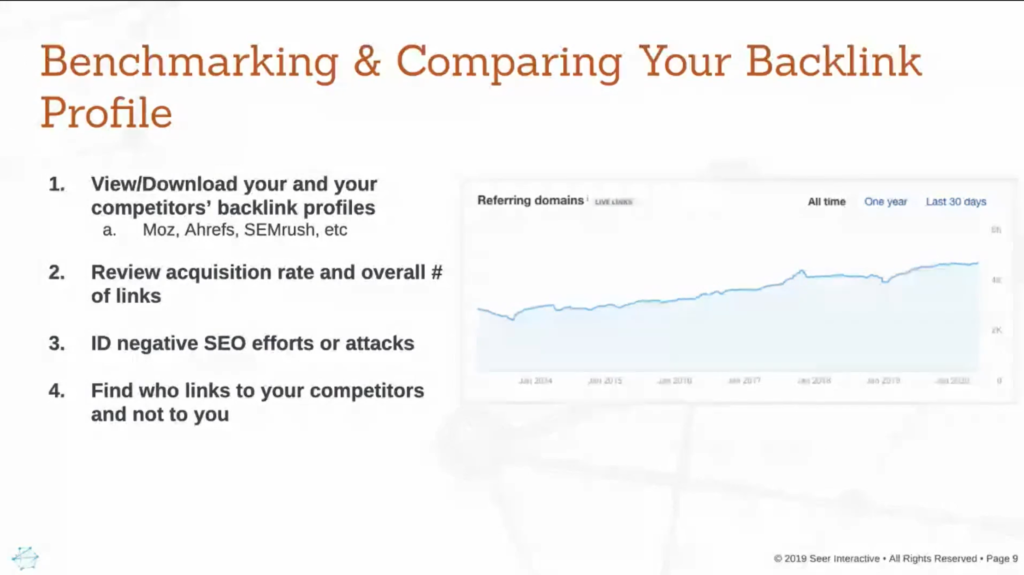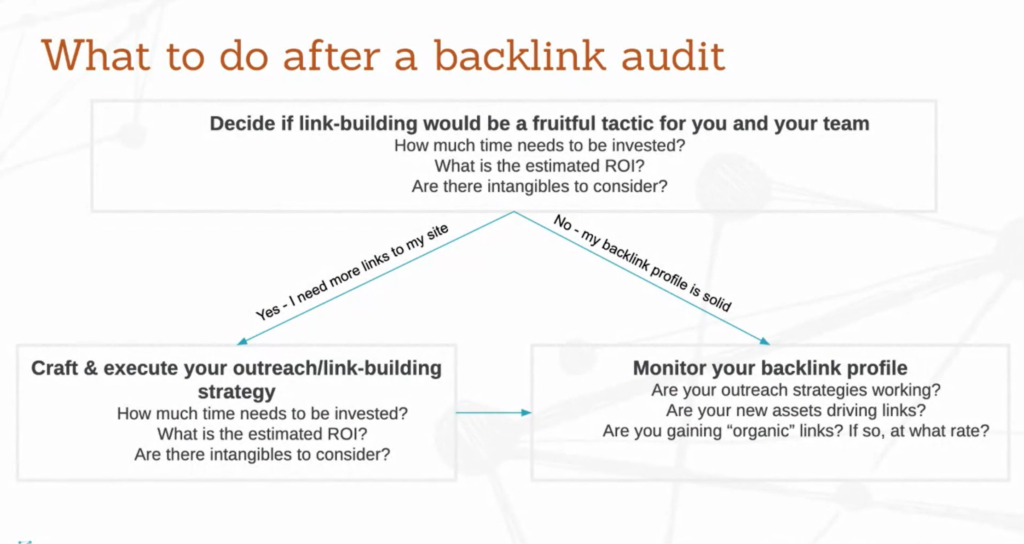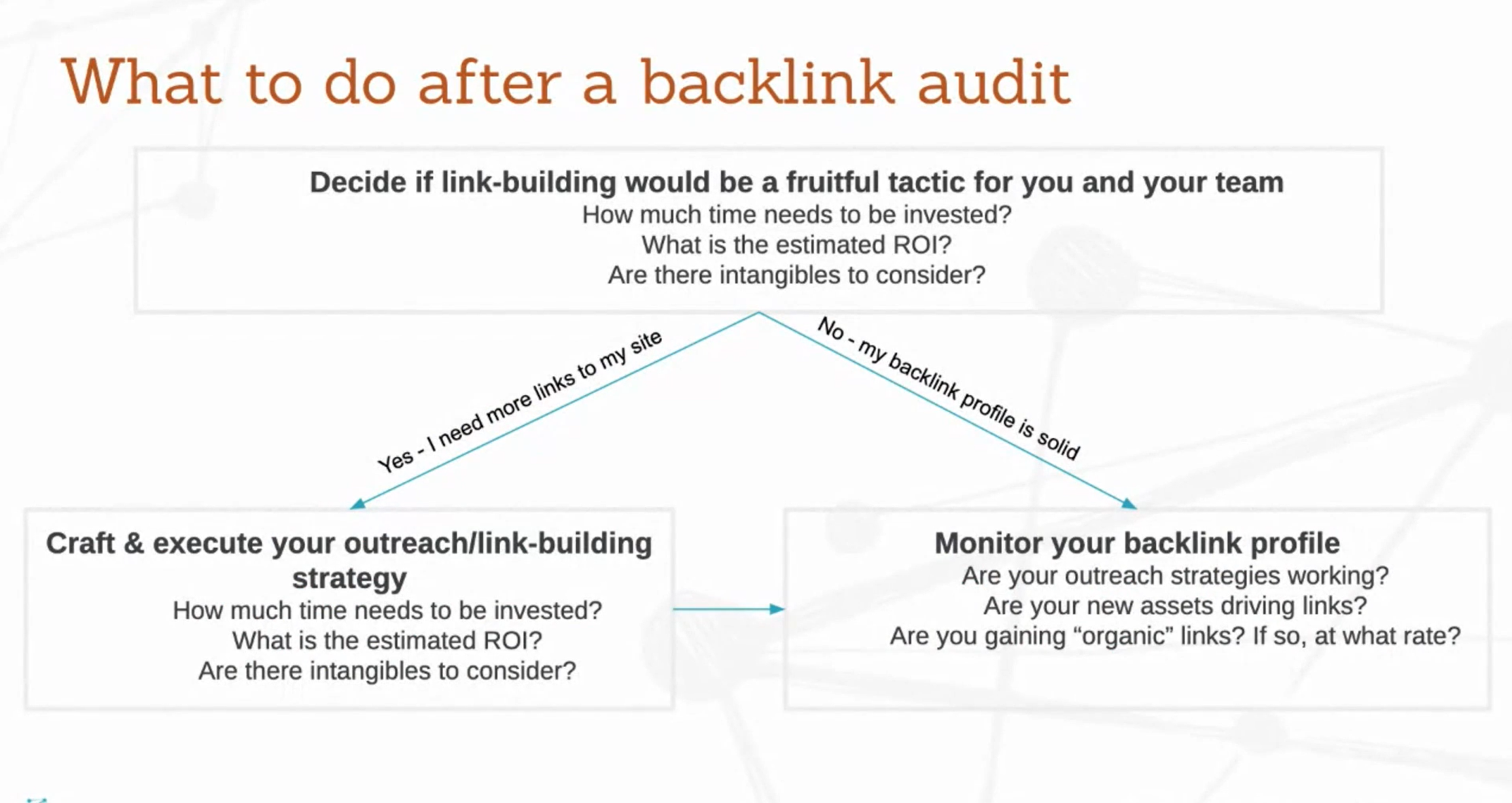In our previous post on backlinking, we discussed the value of a backlink audit. Just as you should perform a content audit regularly to make sure that your content is usable, SEO-friendly, and up-to-date, you should be checking your backlinks on the regular. So, let’s say you’re taking a deep dive into your backlinking situation: you’ve identified poor links from unwanted sites (and disavowed those that Google tells you are truly problematic), you’ve researched which pages link to you, and which of your pages are the most-linked and least-linked. So, what should you do now? And, are inbound links still worth your time?
Is backlinking still important?
Backlinking may feel outdated — older SEOs may remember using backlinking along with tactics like keyword-stuffing and microsites in the earlier days of optimization. However, backlinking is still an integral part of optimization. Google and other search engines are constantly evolving to better incorporate all of the centerpieces of rankings — content match, time spent on site, pages per session, bounce rate, and, yes, inbound links — to match searcher intent. SEMrush actually lists backlinking as the fifth most-important ranking factor for SEO.
However, you still can’t get away with crappy content — and having sheer numbers of backlinks won’t help. You need quality, relevant links, and that process takes time. Not sure whether you need to do more with backlinking? To help decide, check out your competition. By comparing your backlink profile against your competitors’, you can see where you stand.
Benchmark your backlink profile against your competitors.
1. View and download your competitor’s backlink profile.
You can employ multiple tools to check your competitors’ links: Moz, Ahrefs, SEMrush, or whatever works for you. Most of these checkers allow for a certain number of free checks each year.
2. Review your competitors’ acquisition rate and overall number of links.
When you’re comparing your site to a competitor’s, you want to make sure you’re on a similar or higher trajectory of growth. That knowledge can inform your backlinking outreach strategy. If you just started building links within the last month, you’ll likely see more and more fruitful inbound links — and you may be catching or trailing your competitors, depending on when (or if!) they implemented their backlinking programs. Say you’re leading your competitors on backlinks — how do you maintain your lead? If you’re behind the curve, how can you catch up?
3. Identify negative SEO efforts or attacks.
Keep an eye out for spikes in backlinks: these can be a sign of a hack or other intentional attack, or of a link farm sending hundreds of links (and fake views) to your site in attempt to make it rank poorly.
4. Find out who links to your competitors — but doesn’t link to you.
When you’re analyzing your competitors’ backlinking profile, you’ll want to think about their links in the same way you think about your own: who’s linking to them the most frequently? Which pages are the most valuable for backlinking, and why? What pages resonate well with their audiences? Consider reverse-engineering their strategy: if your competitors are using awesome strategy that fits similar goals to yours, you can try to improve and perfect on that strategy.
5. Decide what to do with the information from your backlink audit.
Sometimes, after reviewing a backlink audit, you’ll still be wondering whether backlink strategy is a useful way to spend your time. Zaine says he’s performed backlink audits that uncovered that a client has far more backlinks than competitors (both search and direct), their content ranks well, and there’s not much left to do from a linking perspective. That brings us to an important step of the backlinking process: deciding whether it’s worth your time.

Determine if link-building will be a fruitful tactic for you and your team.
Link-building isn’t content or site structure: if your site is better than your competitors’, this tactic just doesn’t need to be at the top of your priority list. Creating link-building relationships can be time-consuming, and, in some cases, link building won’t really move the needle for your site. In order to weight the importance of a link-building program, you need to consider:
- What is the estimated ROI? How much higher in the SERPs do you believe that linkbuilding will push your site — and what is the value of that organic improvement? Check out our organic ROI calculator to make an educated guess on how moving one, two, or more spots in the SERPs will impact your revenue.
- How much time needs to be invested? Consider how you plan to increase links. Are you doing relatively low-hanging actions, like creating a Wikipedia page for your brand, or will you need to build an affiliate program, send out press releases to industry publications, or contact journalists in order to earn backlinks?
- Are there intangibles to consider? Even if backlinking won’t increase traffic, it may increase your appearance in non-link SERP results. Link equity doesn’t just raise your blue-link positioning; it may let Google — and users — know that you’re a trusted source.

When is “good enough” good enough?
If the juice isn’t worth the squeeze, follow the “no” branch of the chart above. Your backlink profile is solid! But, you still want to monitor your backlinks — your status may change in a year, or even in six months. You should perform a new backlink audit periodically, and ask yourself:
- Are your outreach strategies working? Ask yourself: Are you seeing a consistent rate of backlinks coming from high-quality, relevant sites?
- Are your new assets driving links? When you create a new piece of content, does that eventually receive organic backlinks from similar websites? If so, which posts, videos, or pieces of media earn the most — and the fewest — inbound links?
- Are you gaining new links organically — without seeking out affiliates? If so, at what rate are you gaining those organic inbound links? What strategies might be working to promote links?
Like everything else in SEO, backlinking changes frequently. Keep an eye on your site, and don’t decide that “good enough for now” is the same as “good enough forever.”
How do you start building a backlink profile?
If you decide that a backlinking strategy is worth your time, you need to craft and execute your outreach and link-building strategy. For that adventure, meet us in our third and final post on backlinking! And, if you’re not sure where to start, give us a call.

